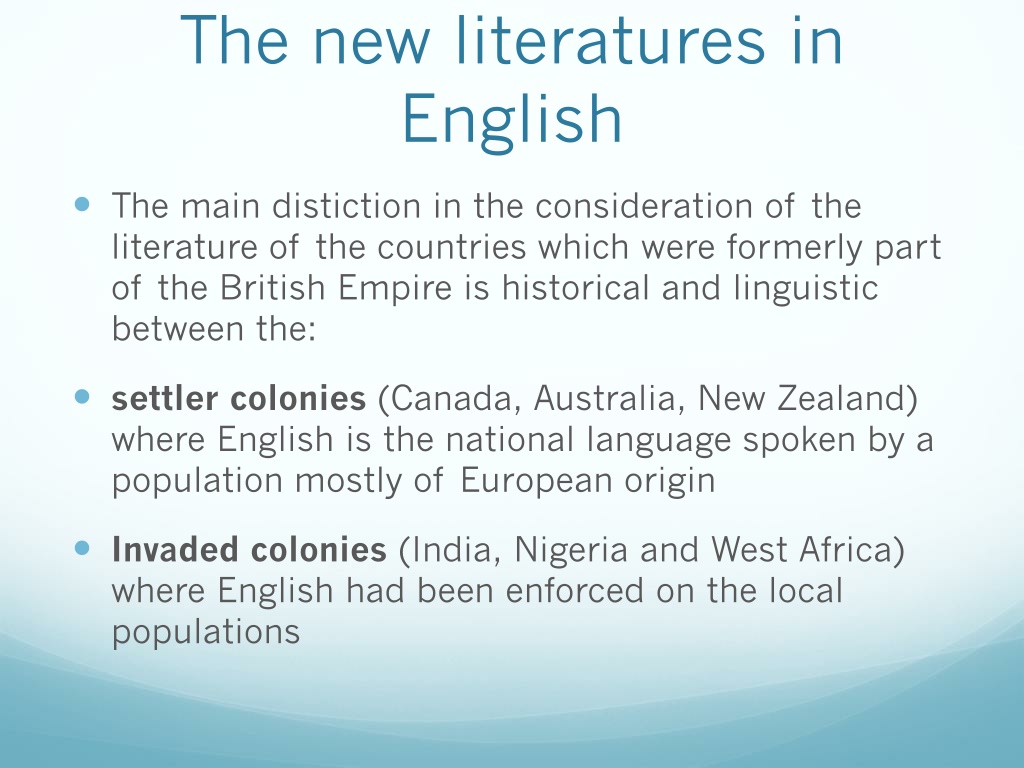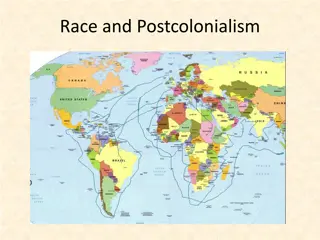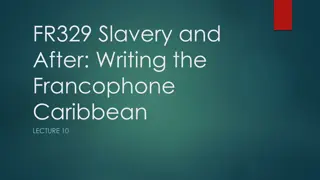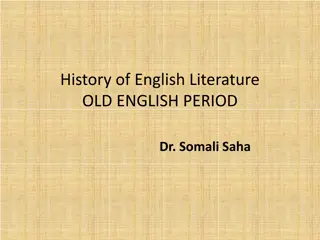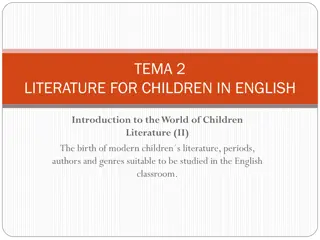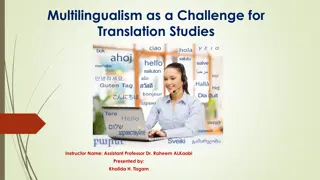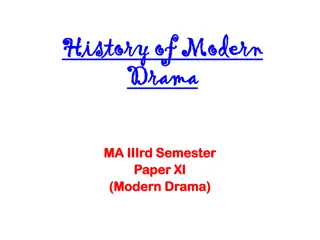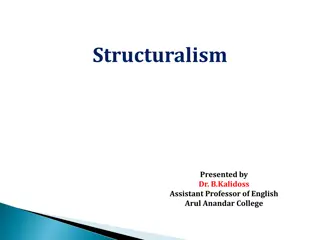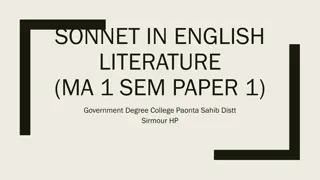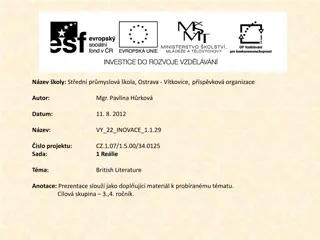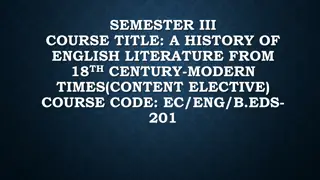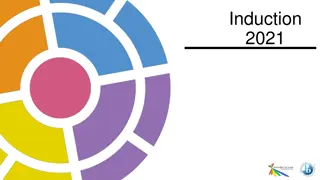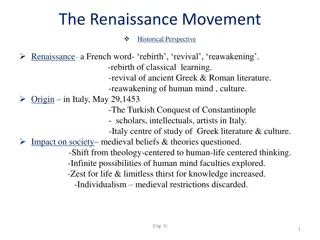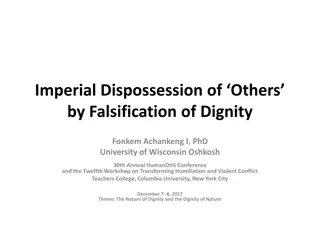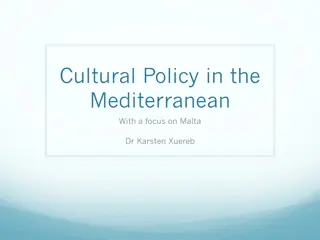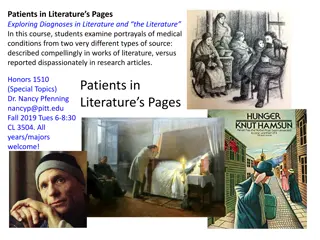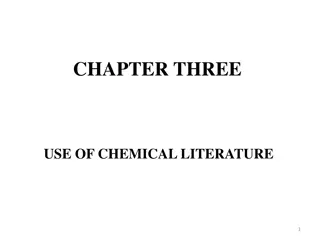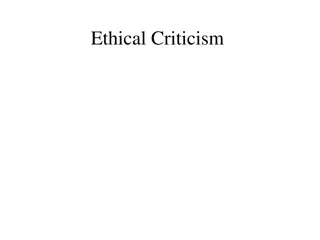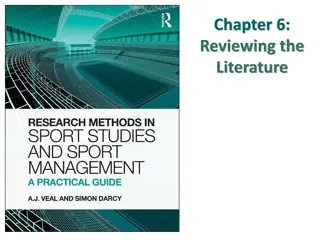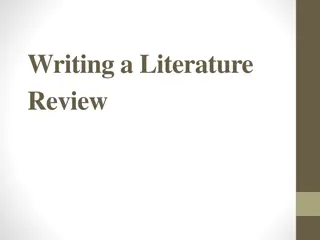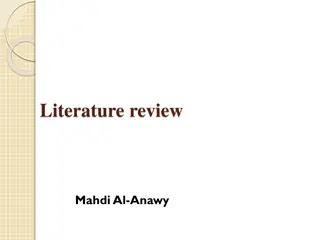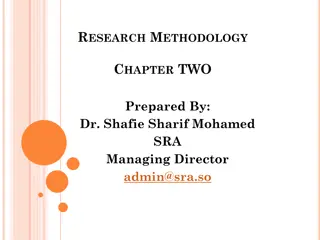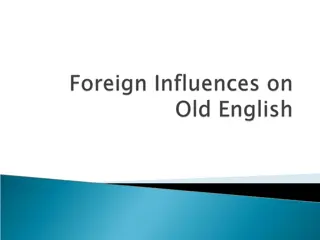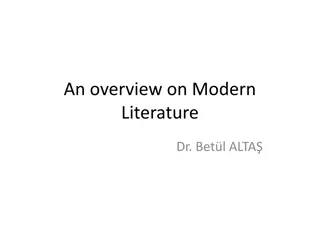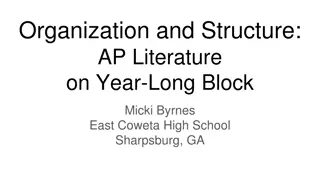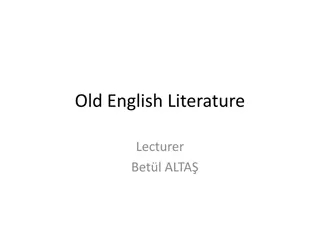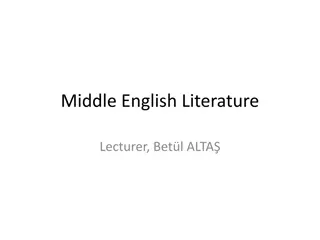The Evolution of Postcolonial Literature in English
The exploration delves into the evolution of postcolonial literature in English, contrasting the experiences of settler colonies and invaded colonies in adopting and adapting the English language. It discusses the impact of historical impositions and themes of identity, exile, and displacement across various regions including South Africa, the West Indies, and postcolonial nations. The analysis highlights the unique challenges and transformations faced by writers navigating the intersection of language, culture, and history.
Download Presentation

Please find below an Image/Link to download the presentation.
The content on the website is provided AS IS for your information and personal use only. It may not be sold, licensed, or shared on other websites without obtaining consent from the author. Download presentation by click this link. If you encounter any issues during the download, it is possible that the publisher has removed the file from their server.
E N D
Presentation Transcript
The new literatures in English The main distiction in the consideration of the literature of the countries which were formerly part of the British Empire is historical and linguistic between the: settler colonies (Canada, Australia, New Zealand) where English is the national language spoken by a population mostly of European origin Invaded colonies (India, Nigeria and West Africa) where English had been enforced on the local populations
The new literatures in English In both cases (D.E.S.Maxwell, Landscape and Theme, 1965) there occurred a separation between place and language, in the first case as imported in an alien environment, in the second the postcolonial writer would write in an alien language, an acquired and imposed language.
The new literatures in English Other specific conditions were those of South Africa (both white and black writers) and the West Indies where English had been enforced first on African slaves and then on Indian Indentured labourers and where the native languages had been erased .
The new literatures in English: the choice of English the differences between the literatures of settler and invaded colonies were important regarding the use of Language (in s.c.their own native language, creation of a national literature and its canon)
The new literatures in English: the choice of English In I.C. an historically imposed language is chosen and appropriated, revitalized and reinvented by writers (see Salman Rushdie s style, for ex.)
The new literatures in English: differences/connections/continuity There are also important thematic differences between national literatures in postcolonial literatures in English But also unifying traits, themes and recurring structuring patterns, among which
The new literatures in English: recurring themes and tropes The paramount theme of IDENTITY EXILE, DISPLACEMENT (geographical, cultural, social, linguistic) RACIALIDENTITY AND CONFLICTS MIGRANCY, DIFFERENCE, ALIENATION ROOTEDNESS, UN/BELONGING
The new literatures in English: recurring themes and tropes EXILE as the unifying, crucial dimension/experience at the centre of postcolonial literatures . different stages : Decolonisation ( decolonising the mind, Ngugi Wa Thiongo ) The search for an independent identity imagining the nation (nation building through literature and culture) imagined communities (B.Anderson)
The new literatures in English: recurring themes and tropes EXILE as the pivotal, unifying, crucial dimension/experience at the centre of postcolonial literatures . different stages: Decolonisation ( decolonising the mind, Ngugi Wa Thiongo ) The search for an independent identity imagining the nation (nation building through literature and culture)
The new literatures in English: recurring themes and tropes The sense of and relationship with history: Roots, displaced and forgotten histories History/herstory/histories: retrieval and memory the importance of retrieved collective memory/ies (slavery, exile, diaspora) The definining category is the relationship with the imperial power, the imperial history of the nation After centuries of colonial and imperial cultural dominance, the Empire began to write back
The new literatures in English: recurring themes and tropes The sense of and relationship with history: Roots, displaced and forgotten histories History/herstory/histories: retrieval and memory The definining category is the relationship with the imperial power, the imperial history of the nation After centuries of colonial and imperial cultural dominance, the Empire began to write back
Postcolonialism: literature and theory 1989 B.Ashcroft, G.Griffiths, H.Tiffin: The Empire Writes Back. A seminal text that influenced the growing body of criticism of Postcolonialism Overall, the use and enrichment of English as the literary language and the awareness of a cultural and national specificity is the defining trait of many diverse literary productions that have cropped over the past 50 years
Introducing Postcolonial literature: the role of literature To understand why so many postcolonial writers wanted to appropriate and rewrite the English canon (the most important literary texts of British literature), one has to remember that: In the British Empire the study of English literature had become the source of moral values and held an almost religious value and function It became the study of models of moral worth English literature became a synonym of morality and civilization
Introducing Postcolonial literature Orientalism created a hierarchy between a civilised, cultured West, and an ignorant, savage East which should acknowledge Western supremacy Education was aimed not only at the intellectual advancement of the colonised countries but to consolidate power This was judged and presented as morally legitimated by moral and educational purposes And Culture and LITERATURE!!!! played a crucial role in this process
Edward Said in Orientalism (1987) and Culture and Imperialism (1989) argued that Western culture was essential to the achievement of Imperialism This concern with the relationship between culture and power is the dominant feature of postcolonialism,which has broadened into a disciplinary sub-field in its own right
